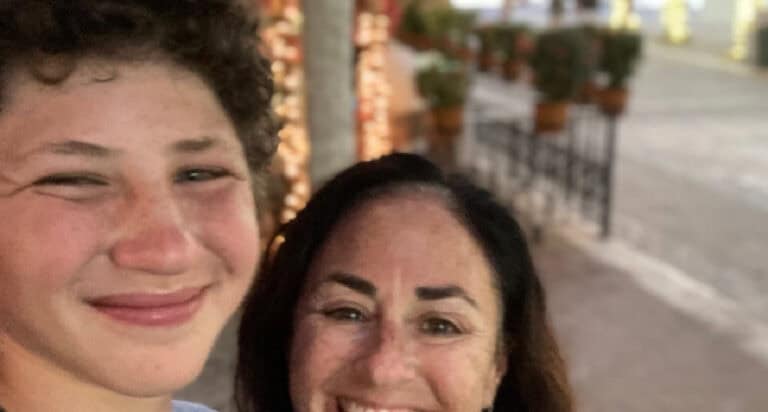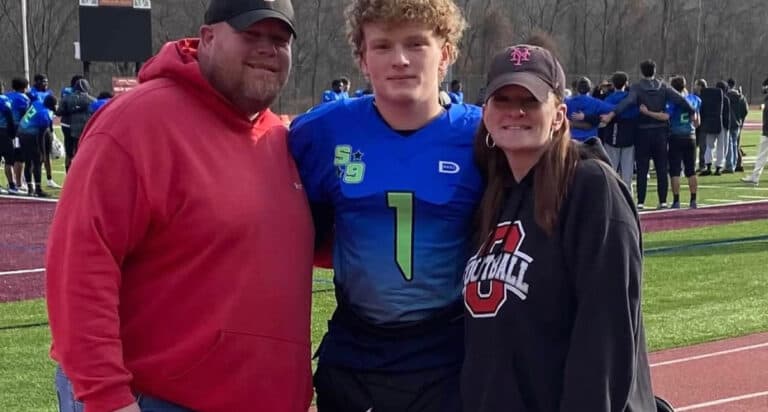I’m going somewhere right now with one of my children I’ve never been before. It’s somewhere she’s never been before, either. It’s a dance neither of us has ever done.
Sometimes, our kids go through things that we are all too well acquainted with ourselves. Their boyfriend or girlfriend breaks up with them and breaks their heart. They don’t make the team. They struggle in school. They are betrayed by a friend. Maybe they battle some physical or mental health issue that’s a genetic inheritance we wish we hasn’t passed down.

When our teens face challenges we are familiar with, we know what to say
Everyone’s experience is their own, of course, but when our kids deal with something we’ve dealt with ourselves, we know some of the lingo. We know what helped us —and what didn’t. We have a past memory bank to draw from and deposit into the present.
But other times, our teens and college kids and young adults face challenges entirely unique to them and foreign to us. We have to learn a new language and become conversant in it all at the same time.
With my own child, I am her student yet again. I’m learning a new way, a new dance. My words still matter. They still have the power of life and hope in them. But I’m needing to build in some fresh vocabulary.
What parents can say when they don’t have personal experience to draw from
If you’re on similarly unfamiliar and uneven ground, here are ten guideposts that might help you find your footing, too.
1. I know I don’t understand what you’re going through.
This is actually very different from, “I don’t understand what you’re going through.” The latter can sound like an accusation…as if we resent our kids for dragging us into murky territory. But adding “I know” to “I don’t know…” can be an acknowledgement: we go on the record that we know what we don’t know—and then go forward from there.
2. I want to understand what you’re going through better than I do.
It’s one thing to admit what we don’t know; it’s another to be committed to moving beyond that point. “Teach me,” we tell our children, even if it’s a class they never wanted to take.
3. What is one thing you think I need to know most about this struggle?
What is the biggest hole in my knowledge base? Let’s fill that in first. We may have an idea where the gaps are in our understanding, but our kids are the unwitting experts in their “field.”
4. Is there anything I’ve done lately that has helped you?
We want to be helpful, but our efforts can be missing the mark. On the other hand, we could be hitting it without even realizing it. Our kids can help us maximize our impact.
5. Is there anything I’ve done or said lately that has made this harder for you?
If our comfort is rubbing wrong or our help is hindering, we need to edit it, because the point is to lift a load, not pile more weight onto it.
6. I can see that you’re making progress.
Our kids fight their battles from the inside out. They’re so close to the struggle, they can lose sight of their victories. A few miles along our mutually unfamiliar way, I asked my daughter if she thought she was making improvement. She said, “I’m not sure.” But I was.
Without trying to talk her out of her own self-assessment, I told her what I was seeing from my vantage point, which was that she was reacting more calmly to situations that would formerly have unnerved her. In the moment—IN it—she hadn’t noticed, but when I shared what I’d observed from my removed position, she was able to recognize the progress she’d been too close to the process to see.
7. I’m sorry this is so hard for you.
This phrase isn’t just filler for when we don’t know what else to say. It communicates two foundational facts: what burdens our kids burdens us; and we recognize the weight of the load they’re carrying.
8. There is no shame in struggling.
I learned that my daughter needed me to tell her in no uncertain terms, “Don’t waste your fight on shame. It is a greedy monster that does not have your best good in mind. Reject it every chance you get and save your fight for the battles that will help you win the war.”
9. Asking for help doesn’t make you weak; it makes you wise.
Our big kids hear so much about self-sufficiency and becoming independent (both important processes in their development) that they can get the idea they’re losing ground if they need assistance along the way. I wanted to reassure my daughter that availing herself of resources beyond herself wasn’t setting her back but helping her move forward.
10. Someday, what you’re going through will help you help someone else.
In the thick of our kids’ struggles, they may not care if they can ever help anyone else. But we can still encourage them that nothing is wasted if they learn from it, and that lesson is even more worth the work if it helps our kids teach someone else. Maybe that someone won’t have to step in the same potholes our kids did when they were walking an unmarked road. Maybe that someone won’t have to hit the same roadblock. Maybe our kids’ rough way will make someone else’s a little smoother.
My daughter once told me, “Thank you for supporting me even when you don’t understand what it is you’re supporting.” I’m sure I’ve missed rather than hit some days. I’m sure I’ve said the wrong thing or not said the right thing.
But my big kid’s words reassured me that somehow, with lots of grace helping me out, I’ve paid less attention to “what” I was trying to support—part of a dance I did not know—and more attention to “who”: my child…who is worth every tricky step.
More to Read:









